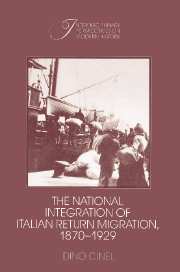Book contents
- Frontmatter
- Contents
- Acknowledgments
- Introduction: Emigration and the process of national integration
- 1 The difficult task of national integration
- 2 A blueprint for change
- 3 The southern ethos
- 4 The national debate
- 5 Return migration
- 6 American remittances
- 7 Investing American savings
- 8 Regional differences
- 9 Return and retirement
- Conclusion: National integration and return migration
- Notes
- Index
- Frontmatter
- Contents
- Acknowledgments
- Introduction: Emigration and the process of national integration
- 1 The difficult task of national integration
- 2 A blueprint for change
- 3 The southern ethos
- 4 The national debate
- 5 Return migration
- 6 American remittances
- 7 Investing American savings
- 8 Regional differences
- 9 Return and retirement
- Conclusion: National integration and return migration
- Notes
- Index
Summary
The challenges of the new state
When European emigration started in the 1870s, Italians largely ignored it. The new country had to face so many challenges that the departure of a few thousand people seemed irrelevant. Soon enough, however, emigration became a mass phenomenon that could not be ignored. The debate on emigration engaged Italians at virtually all levels. Popular writers made Italians aware of the event, its pitfalls and rewards. Social scientists discussed its causes, assessed the potential for the nation, and made recommendations. Politicians debated the responsibilities of the government and of the private sector as well as how emigration could be channeled to achieve larger goals. And interest groups struggled to promote, discourage, or direct the phenomenon, according to their own private agendas.
This chapter deals with the national debate on emigration from the 1870s to World War I. Initially the national debate focused on the large national problems of political integration, economic development, and the special needs of the south, as Chapters 1 and 2 describe. Part of the national debate was also concerned with the effort to understand southern culture as the only way to deal effectively with the region. The debate on emigration was marginal at best. Emigration was considered a nuisance, perhaps serving as a safety valve at times, a means to be rid of undesirable and disgruntled Italians. Progressively the debates about the south and emigration converged, as more and more people realized that not only southerners were emigrating in large numbers but also that the southern problem could perhaps be solved through return migration and remittances.
- Type
- Chapter
- Information
- Publisher: Cambridge University PressPrint publication year: 1991

